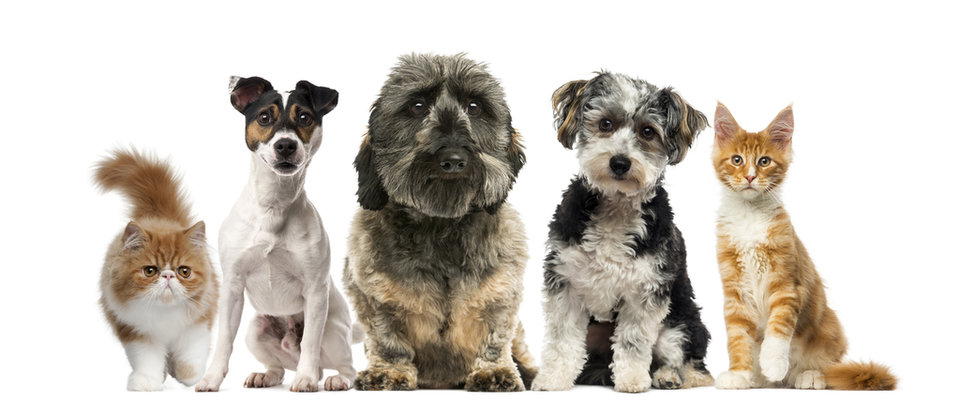
Getting
fixeD
Increasingly, science is realising that having a pet is good for people’s wellbeing. Studies have demonstrated that even just looking at pictures of dogs and cats can make people’s oxytocin levels increase!

It’s often said that a kitten or a puppy is for more than Christmas … and that’s the truth. There is a responsibility of care that goes beyond simply feeding, housing and exercising them. Pets become part of the family. Regardless of whether it’s a budgie, goldfish, hamster, dog or cat, the affection parents and children alike bestow on them is unconditional – but then they give so much in return too. Animals trust and love unconditionally. They provide companionship and entertainment, rumbling purrs and rasping kitty licks or happy barks and slobbery canine kisses. What’s not to love?
There are thousands of people worldwide who can attest to the wellness and mental health benefits of being a pet parent during the pandemic enforced lockdowns. Animal shelters globally benefited from people adopting animals to isolate with! Then there are the physical health benefits: a dog requires regular exercise and taking Fido or Bella for a daily stroll or run can boost the owner’s fitness too. Research has also shown that children growing up in households with a pet have improved immune systems.
The City of Cape Town made headlines recently when it announced that the city pet ownership by-laws were being amended to make animal sterilisation mandatory. The move has been widely welcomed by the many animal welfare organisations and non-profit bodies in the same sphere.
Animal Welfare Society of South Africa (AWS) spokesman Allan Perrins described the city’s move as “a triumph”.

“In our experience that spans over 90 years, there are few animal welfare interventions that have a greater beneficial impact than mass pet sterilisation programmes,” Perrins said. Their biggest battle was against the scourge of animal overpopulation and cruelty, he said.
The Society for the Prevention of Cruelty to Animals (SPCA) echoed that sentiment with Cape of Good Hope SPCA spokesperson Belinda Abraham expressing similar delight. “The SPCA has been and remains under significant pressure resulting from the numbers of stray and unwanted animals coming into our facility daily,” Abraham said. The festive season is always a bad time with thousands of animals either found as strays or voluntarily surrendered to the SPCA.
The city’s amended Animal Keeping By-Law replaces the 2010 legislation, a press release stated. “Some of the elements retained in the amended by-law include guidelines on the number of animals to be kept on specific properties and working equines. And, while the previous by-law contained provisions around mandatory sterilisation in specific circumstances, the amended by-law has a general mandatory sterilisation clause,” said chairperson of the safety and security portfolio committee, Mzwakhe Nqavashe.

In a nutshell, all cats and dogs over the age of six months must be sterilised. According to the by-law: “Keeping, breeding, or selling any animal within the scope of business or economic activities requires an authorisation from the city.” Should anyone want to breed their dogs, they would need to apply to the city for a special permit by downloading the relevant form on the city’s website, and paying the required fee should approval be granted.
The AWS said the positive of the city’s sterilisation hard line was that it allowed both metropolitan enforcement staff as well as their own (and SPCA) officers “more bite than bark” when it came to animal welfare. “We envisage it being policed on a proactive basis,” Perrins said, “and enforced on a reactive basis with guilty parties facing possible imprisonment and/or hefty fines. This is very welcome news and should be seen as one of the greatest gifts the City of Cape Town has ever given its significant pet population.”
While the sterilisation angle is obviously the one which grabbed the headlines, the amended by-law is comprehensive and provides a “clear guide to animal owners or caregivers, breeders of animals and the public at large, as to how to apply the duty to care principle to all animals within the city’s jurisdiction,” the city’s statement read.
Furthermore:
“The city proposes a basic duty of care which animal owners will need to follow. This includes:
“All animals must have sufficient accommodation, food, water and shelter as per the animal keeping by-law and other relevant legislation as determined by the authorised official who may consult with animal welfare inspectors.
“Any form of animal cruelty, which includes but is not limited to, animal-fighting, neglect, frightening an animal, torture or violence towards an animal and neglect of animals, must be prohibited.
“An important aspect of developing an environment conducive to animal care is providing public spaces where animals can be exercised, such as free run public spaces for dogs and public spaces where horses are permitted to be ridden. These public spaces should be clearly signposted and must form part of the urban landscape.
“The locations of these public spaces should be communicated regularly via the city’s communication channels to the public.
“Dogs are otherwise required to be on leashes or under the control of owners, 18 years and above, in public places to avoid causing nuisance or danger to other residents.”
What many pet owners didn’t realise is that all pets are supposed to be registered with the city as well. “The permitting of small and large animals, including dogs, cats and horses, is compulsory, and the city will determine the format and process of registration. Registration may be done online via the city’s website or by submitting a registration form to a city office or as a part of a registration drive run by the city from time to time.”